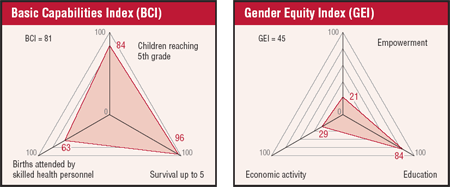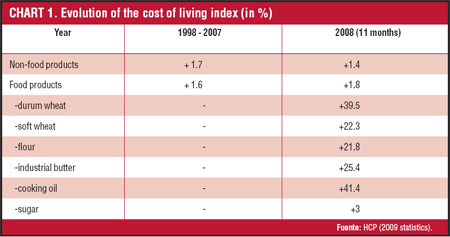Direct impacts, weak responses
Direct impacts, weak responses
Espace Associatif1
Morocco’s heavy dependence on the world economy has made it vulnerable to the global economic crisis. A drop in the demand for Moroccan exports, the sharp reduction in remittances and a severe inflationary process are some of the worst effects. The scant success of anti-crisis policies promoted by the Government aggravates the situation and increases social instability. New proposals arise from the unions and civil society in order to create new conditions for a more equitable economic and social model.
 |
While the impact of the systemic crisis is most evident at an economic level, the cost in social and human terms should not be overlooked. This cost could be high, although it is hard to evaluate for at least two reasons. The first is that the negative effect of the global crisis on the Moroccan economy is only in its initial stages and there is a risk that it may intensify in the near future, with ever-increasing social consequences. The second is related to the fact that, at the moment, there are no reliable and disaggregated official data available with regard to the social impacts.
The social aspects of the crisis
The social impacts will make themselves felt through several macroeconomic channels. According to the economic growth forecasts of the High Commission for Planning (HCP, in French), non-agricultural activities will show a net reduction of 3.9% in 2009 against 5% in 2008, due to the worldwide recession which will cause global demand for Moroccan products to fall 1.2% in 2009, after a growth of 2% in 2008. Exports dropped 31.8% in January-February 2009, compared to the previous year, while the cost of imports only fell 15.7% as a consequence of lower prices for raw materials in recent months. Tourist income and foreign investments decreased 25.5% and 71.9% respectively between January-February 2008 and the same period in 2009.
The impact on employment is already being felt. Thousands of workers – particularly women – have been laid off over the last months in the textile and clothing industry, and work schedules have been drastically cut. At the same time, several companies are beginning to consider salary cuts, postponing staff promotions and training incentives, as well as cutting back on training budgets. Others are abandoning hiring projects and/or favouring short-term employment contracts.
Another form of transferring the crisis to poorer households is linked to remittances sent by Moroccan Residents Overseas (MREs, in French), which in 2008 represented over 8% of Moroccan GDP. According to some studies, these transfers contributed to a decrease in poverty of 4.2 percentage points, from 23% in the late 1990s to 19% at present. However, MRE remittances have fallen about 15%, from MAD 8,200 million (some USD 1,020 million) in January-February 2008, to little over MAD 7,000 million (USD 870 million) for the same period in 2009. A major reduction should therefore be expected in sources of income and in the purchasing power of the families of emigrants, who belong mainly to the poorer sectors of the population. The negative impact of the reduction of MRE transfers also risks impacting on real estate, which provides work for thousands of Moroccans in many regions of the country, particularly in the east.2
Moreover, the crisis will probably mean increased unemployment among some MREs, who therefore risk lapsing into poverty. In Spain, for example, the unemployment rate amongst Moroccans – the largest foreign community after European Union nationals – is over 21%, compared to 14% for Spaniards. Increased violence and racist and xenophobic acts, which often focus on Maghrebi foreigners, will probably increase in several European countries.
The third factor affecting the vulnerable social layers of the population is inflation, which has increased sharply during the last two years, rising from an average level of under 2% in the 1996-2007 period, to 3.9% in 2008. This rate, however, does not show the wide-ranging price hike for staple items during the last two years (see chart). The impact of these increases will be more damaging for disadvantaged social strata, amongst whom basic foodstuffs (e.g., cereals, sugar and cooking oil) represent over 50% of the family budget.3
The loss of purchasing power will consequently be reflected in a reduction in the quality and quantity of foodstuffs consumed and/or the sacrifice of other expenses (such as education, health and transport). Children, pregnant women and nursing mothers will be at particular risk. Moreover, there is a risk that chronic malnutrition will persist due to the lack of micronutrients – such as vitamins and minerals – which close to a third of the population suffer from, especially women and children under the age of three.
 |
The energy and environmental crises
The energy crisis has aggravated the difficulties of daily life for the disadvantaged strata and even for the middle strata, particularly due to rising water, electricity, sanitation and public transport bills, which represent around 15% of the Guaranteed Inter-Professional Minimum Wage (SMIG, in French).
The environmental crisis, which is a consequence of demographic pressures and a development model focused on growth and urbanization, threatens to exhaust resources and worsen standards of living and sanitary conditions. The floods, downpours and snowfalls which have recently affected several regions, killing over 40 people and exposing thousands to total indigence and poverty, are a good example of these dangers.
In conclusion, the impact of the multilateral crisis of neoliberal capitalism places the fulfilment of economic and social rights at risk, particularly the right to food, to work, to health and access to water, and to mobility. Moreover, new population groups run the risk of falling into poverty. Achieving the Millennium Development Goals in Morocco may be seriously endangered if the current crisis persists and worsens.
Government measures in response to the crisis
The Government has taken measures to help some of the sectors which are particularly exposed to the crisis, such as the textile and clothing, leather, and automobile equipment sectors. This anti-crisis plan has three dimensions:
- With regard to social aspects, the State will take on 100% of employer payments to the National Social Security Fund, and the export companies benefiting from this measure undertake to retain their personnel.
- In the financial area, the Central Guarantee Fund will provide guarantees in favour of exporting companies so that they can have access to exploitation credit, and postpone 2009 expiry dates for investment credit.
- In commercial terms, the State will assume 80% of the expenses of trade or market diversification missions.
In order to limit the impact of higher global prices on basic products, the Government has adopted an increase in Compensation Fund amounts to subsidized products, the temporary suspension of taxes on wheat imports and a slight increase of minimum hourly wages.
Exporters in the textile and clothing sector benefited from the social dimension of the anti-crisis plan, which did not prevent them from reducing workers’ salaries or cutting working schedules. The financial and commercial measures had very little effect, due to the reluctance of banks and the lethargy of exporting enterprises. Lay-offs and restrictions in working conditions have also affected several sectors which are barely covered by the plan (such as tourism, export agriculture and construction). The supposed social measures had scant effect on the rise of the prices of staple items, most of which are deregulated, while the increase of the minimum wage barely compensated for the rise in the cost of living. This led to a net loss in purchasing power for thousands of workers. It may be concluded that the Government still has a greater interest in protecting capital than in defending the economic and social rights of the disadvantaged social strata.
Civil society’s response
In such a situation it is hardly surprising that there should be new outbreaks of worker and social unrest. Protests are led by the unions, by some civil society associations and by coalitions of both, and joined by left-wing politicians and other groups. Renewed conflicts with unions emerged as a result of the deterioration of economic and social rights and the failure of social dialogue, due to the Government’s refusal to satisfy union claims with regard to the revaluation of salaries and family subsidies, civil service promotions, compliance with trade union freedom and the right to strike, and the adoption of social protection.
To date, there have been several sectoral strikes (education, health, local communities, etc.) and a general strike as well. Amongst other particularly dynamic social movements, it should be mentioned the various struggles fostered by the Coordinating Committee against the High Cost of Living, as well as by the National Associations of Unemployed Professionals. Several collective action strategies have been deployed, such as sit-ins, spontaneous popular marches and national mobilization days against poverty. Demands make reference to halting the increase of prices, sustaining the Compensations Fund, applying a mobile salary scale, bringing public services up to standard, stopping the privatization of water and electricity distribution, and claiming the right to work in the civil service. The Government has suppressed some of the demonstrations with a heavy hand; a case in point are the events that took place in the cities of Sefrou and Sidi Ifni. Moreover, certain difficulties appear to be hindering the activities of these movements, such as internal disagreements, little activity with regard to vulnerable populations and the absence of political perspective.
This does not mean that there are no alternative proposals in order to confront the crisis and promote the economic and social rights of the disadvantaged social strata. On the basis of the principle that the State should guarantee economic and social rights, social movements propose creating an insurance fund against unemployment, the defence and democratization of public services, combating monopolies and situational income, and establishing a guaranteed minimum income, as well as supplying civil society with data and information in order to raise the awareness of public opinion and mobilize vulnerable populations. In the long term, the main role of the democratic State must be to promote economic and social rights through the creation of citizen forces, which favour a new economic and social model based on social justice and give priority to the satisfaction of basic needs, food autonomy, social economy, and the protection of the environment and cultural diversity.
1 Associations, unions, researchers and representatives of social movements and Espace Associatif participated in this report. Said Saadi (university graduate and associative actor) was the editorial director.
2 Bourchachen, J. “Apports des transferts des résidents à l’étranger à la réduction de la pauvreté: cas du Maroc”, SessionI-Pa 5c, Montreux, September 2000.
3 High Commission for Planning (HCP). Journée africaine de la statistique on “Défis de la hausse des prix des denrées alimentaires”. Rabat, 2009.


